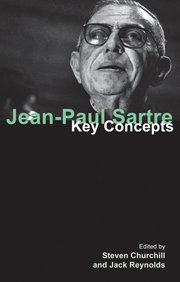Book contents
- Frontmatter
- Contents
- Contributors
- Acknowledgements
- Note on abbreviations
- 1 Introduction: Sartre vivant
- 2 Life and works
- Part I PSYCHOLOGY, PSYCHOANALYSIS AND LITERATURE
- 3 Sartre and Husserl's Ideen: phenomenology and imagination
- 4 Sartre's understanding of the self
- 5 Contingency and ego, intentionality and nausea
- 6 Sartre: novelist and playwright
- 7 Psychoanalysis and existential psychoanalysis
- Part II ONTOLOGY: FREEDOM, AUTHENTICITY AND SELF-CREATION
- Part III ETHICS AND POLITICS
- Bibliography
- Index
3 - Sartre and Husserl's Ideen: phenomenology and imagination
from Part I - PSYCHOLOGY, PSYCHOANALYSIS AND LITERATURE
- Frontmatter
- Contents
- Contributors
- Acknowledgements
- Note on abbreviations
- 1 Introduction: Sartre vivant
- 2 Life and works
- Part I PSYCHOLOGY, PSYCHOANALYSIS AND LITERATURE
- 3 Sartre and Husserl's Ideen: phenomenology and imagination
- 4 Sartre's understanding of the self
- 5 Contingency and ego, intentionality and nausea
- 6 Sartre: novelist and playwright
- 7 Psychoanalysis and existential psychoanalysis
- Part II ONTOLOGY: FREEDOM, AUTHENTICITY AND SELF-CREATION
- Part III ETHICS AND POLITICS
- Bibliography
- Index
Summary
With [the] distinction [between noetic and noematic analysis] … there becomes salient a distinction between two realms of being which are radically opposed and yet essentially related to one another.
(Husserl 1983: §128)Since the being of consciousness is radically different, its meaning … is opposed to the being-in-itself of the phenomenon.
(BN1/BN2: Introduction)Sartre's relation to Husserl may seem curious, if not downright paradoxical. An outspoken enthusiast of phenomenology, which would liberate philosophy of its idealist heritage and bring it back into the world, Sartre was simultaneously, and just as passionately, an uncompromising critic of the methodological and categorical apparatus the Husserl of Ideen I (first published 1913; translated as Ideas Pertaining to a Pure Phenomenology and to a Phenomenological Philosophy, Husserl 1983) put into the service of mapping out transcendental consciousness. One could dissolve this paradox by deeming Sartre faithful to the perceived spirit of Husserl's phenomenology, but not to its word. Yet such a settlement glosses over the fact that this paradox is not simply a result of a scholarly disagreement. Sartre holds philosophy accountable in the face of the world where suffering, hunger and the war are both a possibility and a daily reality – the philosophical task cannot therefore ever be confined to a narrowly epistemological problem, but must also be existential, ethical and political. Husserl's phenomenology was oriented towards the more classically academic task of ascertaining true knowledge and founding a rigorous philosophical science.
- Type
- Chapter
- Information
- Jean-Paul SartreKey Concepts, pp. 12 - 31Publisher: Acumen PublishingPrint publication year: 2013



